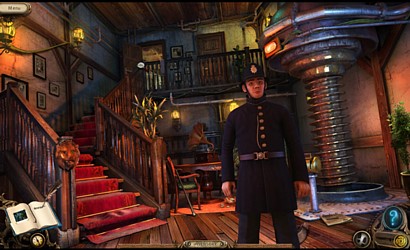
Alex Hunter: Lord of the Mind Platinum Edition (2013 - Windows PC) 
So far, this is the best hidden object game I've played, which is to say it's the longest and most involved. Along with the standard hidden object scenes, there are oodles of puzzles and lots of exploration, so it's only a few steps away from being more like a traditional point-and-click adventure game than a straight-up HOG. As a detective, you're on the trail of a missing scientist in Victorian-era England. Your travels will eventually lead you to a strange alternate reality world, and there's a magnificent bonus chapter in which you explore a gangster's casino that's almost as long as the main game.
Like most hidden object games, there is the option to skip the puzzles, so you still have to limit yourself if you want a challenge (and also to get all the in-game achievements). Anyone who knows me also knows that I'm not real fond of sliding/flipping tile puzzles, and there are a number of those present here, so sometimes I'm actually glad that skip button is there, even if that is a terrible attitude for a gamer to have.
The game is visually decent, but it's annoying that only one song plays for the entire game, even for the bonus chapter. But still, if you've ever thought of giving a hidden object game a try, this is a good place to start.
Rating: 3.5/5

The Clockwork Man (2011 - Windows PC)
The Clockwork Man is the weakest hidden object game I've yet finished, which is kind of sad considering it has a few things going for it. The artwork and music are nice, it has the unique Victorian steampunk setting, and the scrolling/zooming feature for some screens is different, if not as big a deal as one might hope. But not only is the game far shorter than any other HOG I've actually paid for, but the objects are tiny, and this is the type of HOG that likes to tell you to find a hardbound book when there's a million books on the screen. Seriously, look at that screenshot - one of the objects to find is a medicine bottle - any one of those damn cylindrical glass things could be a medicine bottle.
I could describe the story as "fat people tell a prematurely grey woman and her robot to clean up a huge mess wherever she goes". It ends on a cliffhanger that isn't resolved in the sequel. You might be able to get a little more mileage out of it with the "freeplay" mode, but don't expect a fulfilling experience from this game.
Rating: 2/5
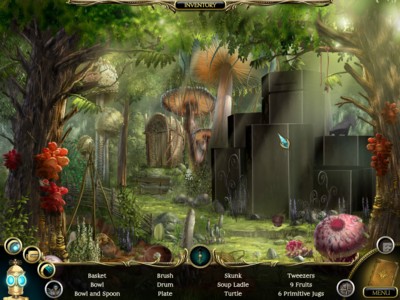
The Clockwork Man: The Hidden World (2011 - Windows PC)
A huge improvement over the first game. The artwork style has improved, the scrolling function has more of an impact both visually and gameplay-wise, and the developers seem to have taken a cue from Samantha Swift. Miranda and her robot now have puzzles to solve and some objects found in the HOG scenes become inventory items that are used to either solve certain puzzles or find other objects. There's also an occasional "scene-within-a-scene", which is common in the Midnight Mysteries games.
Yet, I still don't think this game goes quite far enough to be considered "great". While it feels drastically less cluttered than the first Clockwork Man, some items are still awfully tiny (good luck finding anything long and skinny, like a nail file, without resorting to hints), and you're still sometimes asked to find objects when there are a million things on the screen that could possibly be it. The story is awkwardly bizarre - the moral is that if humans found a way to live forever (or maybe just really, really longer), that would be bad because death is great for some convoluted reason. Okay, I know, everything that lives dies someday, but seriously? This lesson in a silly, otherwise child-friendly hidden object game?
Rating: 3/5
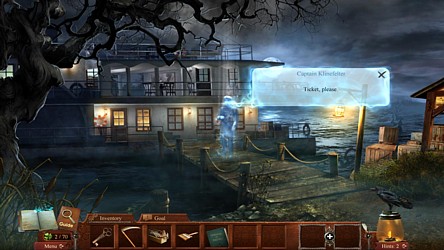
Midnight Mysteries: Devil on the Mississippi (2011 - Windows PC) 
The third in the Midnight Mysteries series deals with the ghost of Mark Twain, and it is the best one I've played so far (although I haven't played the fourth one yet). This installment has come a long way from the simplistic hidden object hunting and braindead puzzle solving of the Edgar Allan Poe Conspiracy. Many puzzles actually require some thinking (although a few are still no-brainers), and HOG scenes now have more purpose with items that are needed to surpass various obstacles.
However, much like the Poe game, there is some seriously revisionist history going on in the plot. Many events are based on things that really happened, like Mark Twain's brother being killed in a steamboat explosion, but then the facts of the events are altered to create a conspiracy that would make Oliver Stone jealous. And what the holy *F* at the Shakespeare subplot???
Rating: 3.5/5

Midnight Mysteries: Salem Witch Trials (2010 - Windows PC)
Much better than The Edgar Allan Poe Conspiracy, but not quite as good as Devil on the Mississippi. This is the second game in the series, so basically they were steadily progressing. This one involves Nathaniel Hawthorne. I'm not as familiar with him as Poe or Twain, but I'm guessing the story is just as revisionist as the others. I had a hard time following parts of it.
Um, Steam, or Mumbo Jumbo? Fix the damn achievements already!!
Rating: 3/5
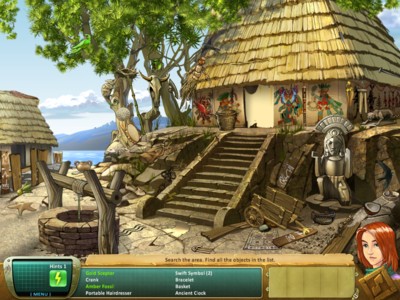
Samantha Swift and the Fountains of Fate (2011 - Windows PC) 
The biggest and best Samantha Swift, which means it's still rather short and easy for hardcore gamers, but as far as hidden object games go, it's right up there with Alex Hunter. Puzzles are generally a bit tougher, the game has more "areas-within-areas", and there's even a trophy room with achievements! The great artwork, ambient music, and Swift's crazy approach to archaeology that the series is known for are gleefully ever-present.
Only one word of warning - don't ever save midway through completing a hidden object scene. I did this once and when I reloaded my save later, everything had disappeared from my inventory, but didn't relocate to the environment. This meant I was stuck with no way to move on. I think these types of games need to include a "reset" option to start the current scene over again from the beginning to protect against bugs like that.
Rating: 3.5/5



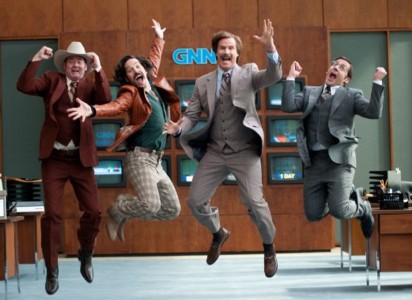
Anchorman 2: The Legend Continues (2013 - DVD)
Has its moments, but not as good as the first one. Seriously, we're this late into the game and still recycling jokes from Saturday Night Live? And other movies that had Saturday Night Live alums in them? I mean, Ron Burgundy saying "black" over and over again to Meaghan Good was exactly like Austin Powers saying "mole" over and over again to Fred Savage in Goldmember. Burgundy going blind was just like when Ricky Bobby got paralyzed in Talladega Nights, only a whole lot weirder here.
And what the heck is it with Saturday Night Live movies having subplots about how you can't put your job ahead of your kids? Click and Elf also had that moral, and when it keeps popping up here, it overshadows and dilutes the subtext about how news has become more about being entertainment than informational. Either SNL people have regrets about spending more time on that show than with their kids, or they're all trying to be the next Mary Poppins, albeit very badly.
Rating: 2.5/5
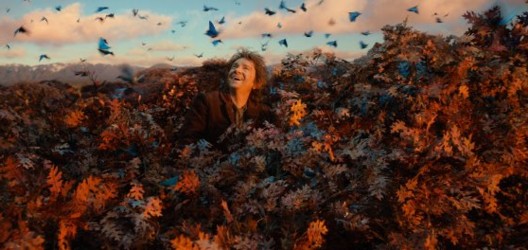
The Hobbit: The Desolation of Smaug (2013 - DVD)
Many critics didn't like the first Hobbit movie, and I was one of the dissenters, but this one hit my breaking point rather early on. The dwarves go down white water rapids in barrels, fighting orcs along the way, and at no point does any barrel overturn or fill with water. Defenses I've seen of this scene are usually along the lines of, "But it's based on a children's book". Yeah, but the barrels were sealed shut in the book, and they weren't popping out of them and fighting orcs, then jumping back into the rapids just in time to land in a magically-appearing open barrel.
And then it's just, Legolas, Legolas, Legolas... I keep seeing people praising his inclusion here because it explains why he hated dwarves in the Lord of the Rings. Did I miss something? I thought it was Gimli who hated elves for no explained reason, not the other way around.
I feel like if I tried to describe the scene where they attempt to use a giant golden statue to kill Smaug, it would come across like Killdozer describing Bridget Jones's Diary, but I'm serious - that actually happens!
Really, Peter Jackson had enough time to add that ridiculously drawn out and pointless scene, but not enough to actually show the desolation caused by Smaug in a movie called "The Desolation of Smaug"??
Rating: 2.5/5



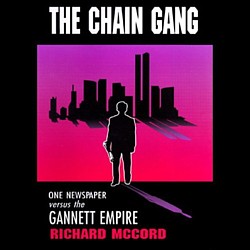
The Chain Gang: One Newspaper Versus the Gannett Empire 
Author & Reader: Richard McCord
(Audiobook - 2005; Original Book - 1996)
The Chain Gang is an absolutely amazing true story of how a small newspaper (no, let's make that basically one man - the author) took on a huge, corporate newspaper chain that was using illegal and unfair tactics to drive smaller papers out of business. It reads like a great work of fiction, but it's actually autobiographical, which makes it all the more jaw-dropping.
Journalist Richard McCord is hired to a small town newspaper to write an article exposing the Gannett corporation. At first, he's not really liked or trusted by anyone around him, and the guy who hired him is almost never around to help. With little cooperation from his co-workers and boss, he's often left to fend for himself. But little by little, the project comes together, thanks in part to his resourceful nature, and slowly everyone starts getting behind him.
There are parts of this book that left me breathless with suspense. When the building gets flooded and you think all their hard, irreplaceable work has been destroyed, every step McCord takes down the submerged hallway is echoed with a heavy heart palpitation.
And then there's the big moment at the end, and...the sobering reality of the aftermath. It's like this man's life, and his experiences in this situation are, intentional or not, a greater metaphor for the way some things are in life. Sure, people can come together for a great cause, and even achieve that momentary success, but the next day, and then the next, and the next... who still continues to care? How much effect does any deed really have in the long run? And where do you go from there?
McCord reads his own audiobook, which gives him a great advantage in achieving perfect tone for every situation, since, well, it's his life, he knows it.
Rating: 4.5/5







